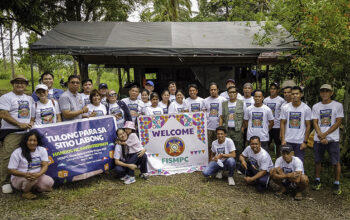MANILA – The Philippine government demanded that China remove “immediately” its vessels from the vicinity of Ayungin Shoal after protesting the dangerous maneuvers of the China Coast Guard (CCG) that caused minor damage and injuries to a Filipino resupply mission en on Tuesday morning.
The Department of Foreign Affairs (DFA) summoned on Tuesday afternoon Chinese Deputy Chief of Mission Zhou Zhiyong to convey its demand.
During the meeting, the Philippines stressed, among others, that China’s interference with the Philippines’ routine and lawful activities in its own exclusive economic zone (EEZ) is “unacceptable.”
“China’s actions in Ayungin Shoal infringes upon the Philippines’ sovereign rights and jurisdiction. The Philippines demands that Chinese vessels leave the vicinity of Ayungin Shoal immediately,” it said in a statement.
DFA Deputy Assistant Secretary Raphael Hermoso conveyed Manila’s protest and reiterated that Ayungin Shoal is a low-tide elevation within the Philippines’ EEZ and continental shelf.
“In accordance with the 1982 UN Convention on the Law of the Sea and the final and binding 2016 Arbitral Award, it cannot be appropriated for sovereignty claims. International law affirms that the Philippines exercises sovereign rights and jurisdiction over the feature,” the DFA told Zhou.
While on its way to escort the resupply boats to BRP Sierra Madre (LS-57), the Philippine Coast Guard’s BRP Sindangan (MRRV-4407) collided with CCG vessel 21555 due to the latter’s “dangerous maneuvers and blocking,” causing minor structural damage to the Filipino ship.
At around 8:15 a.m., another CCG vessel caused a minor collision with Unaizah May 4 (UM40), one of the two resupply boats, again due to the Chinese ship’s “dangerous blocking maneuvers.”
Four crew members of the Unaizah May 4 also sustained minor injuries after CCG vessels 21555 and 21551 pounded the boat with water cannons that shattered the Philippine vessel’s windshield.
This prompted Unaizah May 4 to return to mainland Palawan, with BRP Sindangan as escort.
A number of foreign missions in the Philippines shared the country’s concern over the incident, which was the latest since Manila and Beijing in January agreed “to avoid escalation of tensions.”
Denmark Ambassador to the Philippines Franz-Michael Skjold Mellbin said he is “deeply concerned” at the news that four Filipino personnel were hurt by the Chinese Coast Guard during a water cannon attack.
“(It) underlines the urgent need for a peaceful resolution of the dispute based on international law,” he said in a post on X.
“The dangerous maneuvers and blocking by Chinese Coast Guard and Maritime Militia targeting Philippine vessels engaged in resupply missions is deeply troubling,” he added.
Australian Ambassador HK Yu, who was speaking from Melbourne while the high-level Australia-ASEAN Special Summit was ongoing, also rebuked the Chinese vessels’ moves and called for restraint.
“Discussing peace and stability at the (ASEAN-Australia) Summit. Australia shares Philippines’ concerns about dangerous actions by China’s vessels at Second Thomas Shoal today. We call for restraint and respect for international law, particularly UNCLOS,” she said.
United States Ambassador to the Philippines MaryKay Carlson, on the other hand, reiterated that Washington DC stands with Manila and “strongly condemned” the Chinese maneuvers.
Also expressing their concern were the European Union Delegation in Manila and the Embassies of Japan, The Netherlands, Germany, New Zealand, Finland, and the United Kingdom.
Following the incident, Stratbase ADR Institute president Dindo Manhit said the CCG’s actions are “illustrative of China’s blatant disregard of the Philippines’ national sovereignty and territorial integrity.”
“These acts gravely endangered the lives of Filipinos at sea in the Philippines’ own maritime territory. China’s unprovoked acts of aggression are unacceptable and irresponsible,” he said in a statement. (PNA)










